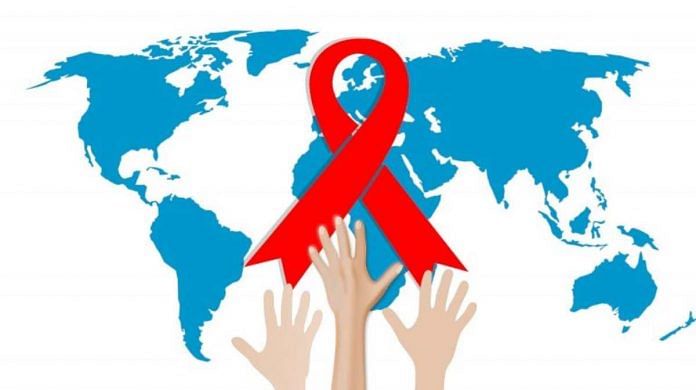New Delhi: More than one in three among those who are at risk of contracting HIV have reported they had either decreased or stopped taking HIV preventive medicine, a survey has found.
According to a pulse survey conducted by Kantar Health, funded by biopharmaceutical company Gilead Sciences with guidance and support from the AIDS Society of India, about 50 per cent of prescribers also reported a decline in prescribing refill antiretroviral medication (ART) to Persons Living with Human Immunodeficiency Virus (PLHIV).
The survey also found a 46 per cent decline in the frequency of taking HIV tests due to the pandemic.
The survey, titled ‘Impact of Covid-19 on access and delivery of HIV care in Asia Pacific’, was published Monday. It was conducted online — from October to mid-November 2020 — across 10 countries in Asia-Pacific (Hong Kong, India, Japan, Malaysia, Philippines, Singapore, South Korea, Taiwan, Thailand, and Vietnam).
As the world marked World AIDS Day on 1 December, the World Health Organization tweeted that the number of countries reporting disruption in HIV care and services has declined by almost 75 per cent since June.
Despite the #COVID19 pandemic, the number of countries reporting disruptions in #HIV services has declined ? by almost 7⃣5⃣% since June thanks to the unstinting work of health and community workers ?.
?https://t.co/1umLdUaUJQ #WorldAIDSDay pic.twitter.com/sJVbKjA8VH
— World Health Organization (WHO) (@WHO) December 1, 2020
According to UN data for India, there were 2.1 million PLHIV in 2017. The same year, 88,000 people new HIV cases were recorded, while 69,000 died from AIDS-related illnesses.
A report by UNAIDS published in May this year stated that there could be hundreds of deaths due to breakdown in HIV care.
The latest survey attributed the reason for the breakdown in HIV care to restricted travel services due to the pandemic and change in high-risk behaviour.
Experts said the breakdown in HIV healthcare services in India was mostly due to the pandemic.
Dr Rahul Bargaje, medical director of Gilead Sciences, South Asia, told ThePrint, “The breakdown in healthcare services and medication among HIV patients in India was largely because of the lockdown, and the fear and risk that Covid-19 posed to such patients.”
He added, “While medical shops were open in most parts of the country, most HIV patients prefer to get their drugs from their designated clinics. Although most of the drugs are available over the counter, they don’t feel comfortable doing so due to the stigma that comes with the disease.”
In a statement, Dr I.S. Gilada, president, AIDS Society of India, said, “The Covid-19 pandemic has had serious implications on the delivery of healthcare services in HIV across the region, be it in low or high-income countries.”
He added: “Despite proactive efforts by the National AIDS Control Organisation to minimise the impact of disruption in medical services and delivery of ART, Persons Living with HIV and at-risk populations suffered a severe blow. Interruptions to access and delivery of care can negatively impact Persons Living with HIV and those at-risk of HIV, putting them at a higher risk of health complications.”
Gilada also said the survey is an indication of the critical gaps in access to testing, treatment and preventive care, and “shines a light on areas that need to be strengthened to prepare for future public health emergencies or disruptions”.
Also read: How decades of work on elusive HIV vaccine has given hope for a ‘quick’ Covid vaccine
97% HIV care prescribers used telehealth to consult with patients
The survey found that about 50 per cent of prescribers reported a decline in prescribing refill antiretroviral medication to persons living with HIV. Some of these antiretroviral medicines include Abacavir, Didanosine, and Emtricitabine.
A health expert, who didn’t want to be named, told ThePrint: “Usually, HIV patients are given a combination of these 2-3 drugs. It depends on the patient’s condition and requirements, but it is important to note that these are prescription-only drugs.”
The survey stated that among HIV care prescribers, almost 97 per cent used telehealth to consult with patients via telephone (85 per cent) or video (50 per cent), or to provide refill prescriptions (67 per cent).
A majority — 76 per cent — of the prescribers surveyed expected an increase in telehealth adoption in the future as it offers convenience, allows them to reach more patients and reduces spread of illness.
‘Digitisation proved to be a boon’
Among the PLHIV and those at risk, the most frequent type of telehealth service received from the doctor was phone consultations — at 58 per cent.
“The digitisation proved to be a boon for HIV patients as most of them consulted their doctors online,” said Dr Bargaje.
Talking about the impact of Covid on HIV patients, the expert quoted above said: “There are no conclusive studies so far that talk about the impact that Covid-19 will have on the bodies of such patients. The presence of the HIV virus and the added burden of short supply of medication can prove to be dangerous for them.”
Also read: Disruption in healthcare services due to Covid may increase HIV, TB deaths, says Lancet study



